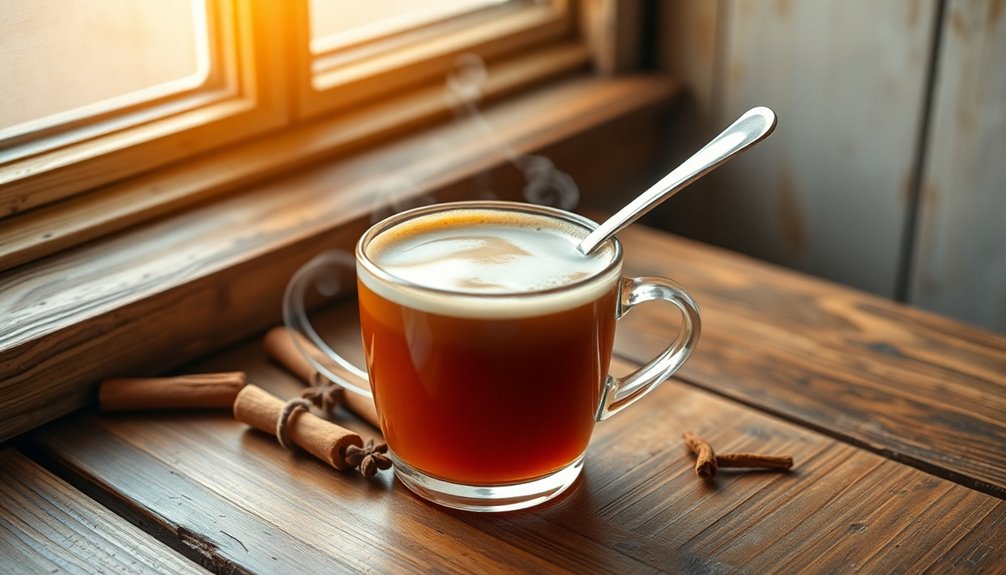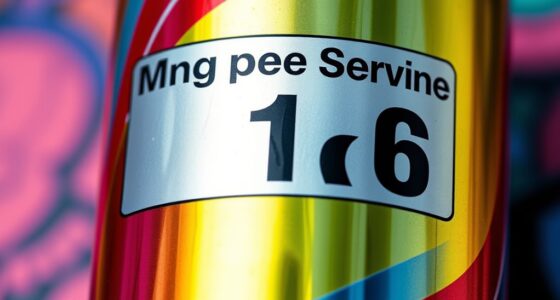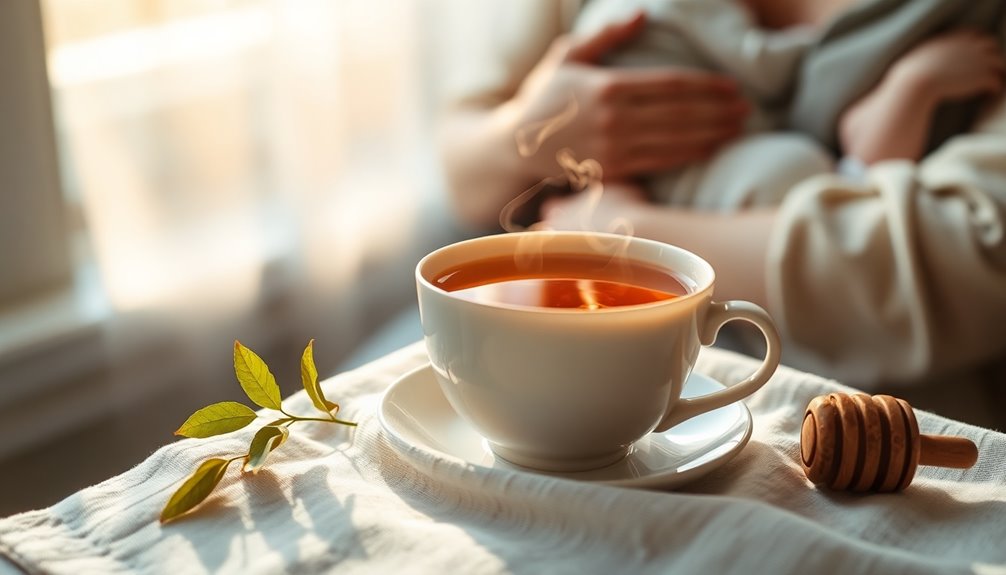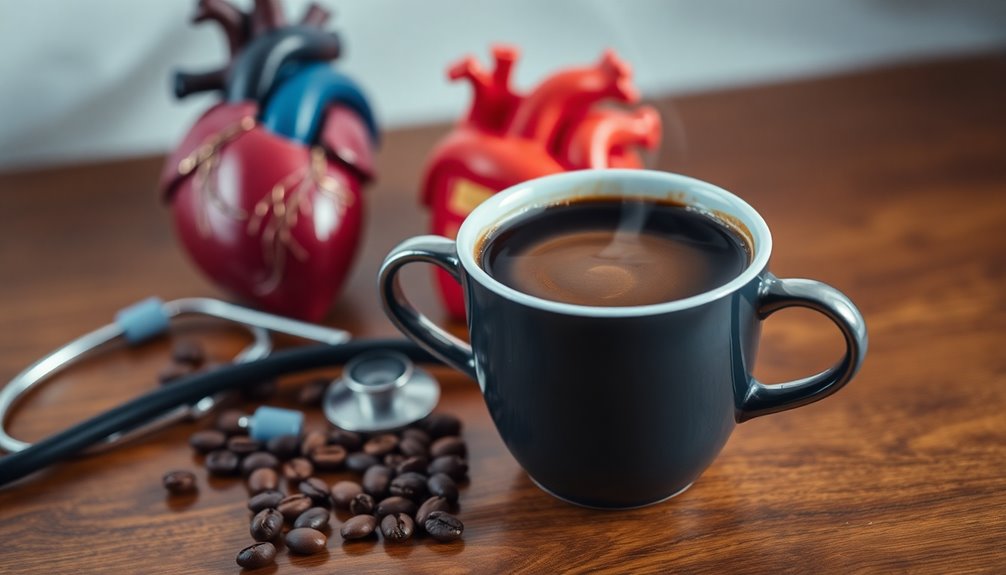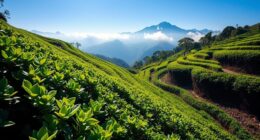A typical cup of chai tea contains about 40mg of caffeine, which is much lower than coffee's 120mg per cup. Depending on how it's prepared, the caffeine content can vary. For example, chai lattes usually have between 25 to 55mg of caffeine, while some specialty blends might go as high as 100mg. Factors like steeping time and the type of tea used can influence the final amount. This makes chai a great option for a moderate energy boost without the jitters. You'll discover even more about the different types of chai and their benefits soon.
Key Takeaways
- A typical cup of traditional masala chai contains approximately 40mg of caffeine per serving.
- Chai lattes can range from 25 to 55mg of caffeine, depending on preparation.
- Rooibos chai is caffeine-free, providing a caffeine alternative without jitters.
- Brewing time and tea type significantly affect chai's caffeine levels; longer steeping yields more caffeine.
- Prana Chai offers a wide caffeine range from 20 to 100mg per cup, depending on preparation method.
Understanding Chai and Its Variants
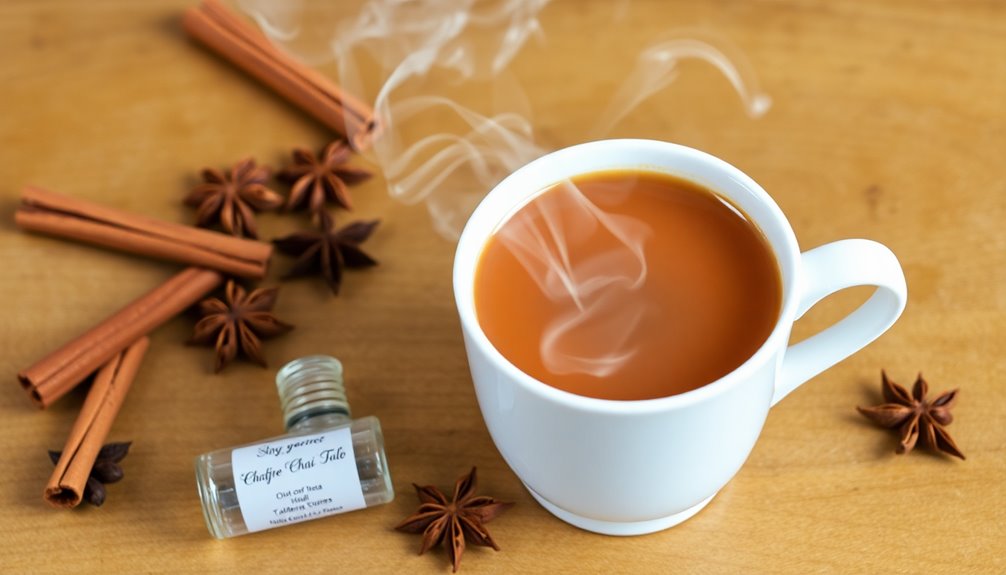
Chai, a beloved beverage with roots in India, comes in various forms that can surprise you with their unique flavors and caffeine levels.
Traditional chai typically features black tea combined with spices, but you can also find chai tea variants like Rooibos chai, which is caffeine-free and perfect for those avoiding caffeine.
The caffeine content in chai varies based on preparation methods; for instance, a chai latte made from powdered mixes usually has between 25 to 55mg of caffeine, while concentrate-based chai contains around 30 to 35mg.
Prana Chai can offer even more variability, ranging from 20 to 100mg per cup.
Embrace the diverse world of chai and discover your favorite blend!
Caffeine Content in Chai

When it comes to chai, you might be surprised by its caffeine levels. A typical cup packs around 40mg of caffeine, considerably less than coffee.
However, factors like brewing time and preparation method can alter that content, so let's explore how chai compares to your usual coffee fix.
Chai Caffeine Levels Explained
Understanding the caffeine levels in chai can help you make informed choices about your beverage. A typical cup of chai contains about 40mg of caffeine, considerably less than coffee's 120mg.
Here's how you can manage the caffeine content:
- Preparation Method: Chai tea prepared with powdered mixes usually has 25-55mg of caffeine, while concentrates range from 30-35mg.
- Steeping Time: Reducing steeping time can cut caffeine levels by up to 80%.
- Caffeine Absorption: Tannins in chai slow caffeine absorption, promoting a calming effect and keeping you in a focused state.
Factors Influencing Caffeine Content
Several factors influence the caffeine content in your chai, making it vital to contemplate your preparation choices.
The type of tea you use plays a significant role; black tea typically has higher caffeine levels than other varieties. Your tea-to-spice ratio also matters, as more tea can boost caffeine content.
Steeping time is important, too—while a standard 4.5-minute steep releases about 13mg of caffeine, extending it to 10 minutes can yield around 21mg.
If you're opting for chai lattes made from concentrates, expect even higher caffeine levels compared to traditional chai tea. Additionally, caffeine can improve focus and reaction time, which may enhance your overall chai experience.
#
Comparison With Coffee Caffeine
How does chai tea stack up against coffee regarding caffeine content? While both beverages contain caffeine, chai tea generally offers a gentler experience.
Here's a quick comparison:
- Caffeine Content: A typical chai contains around 40mg of caffeine, whereas the average cup of coffee boasts about 120mg.
- Caffeine Absorption: The tannins in chai slow the release of caffeine, leading to a calm focus instead of the quick spike that coffee delivers.
- Preparation Variability: Depending on how you prepare chai, like reducing steeping time, you can lower its caffeine content considerably, making it an excellent coffee substitute for those sensitive to caffeine. Additionally, the type of system you choose for your home security can also affect overall costs and performance, similar to how the preparation of chai can influence its caffeine content.
## Comparison With Coffee Caffeine
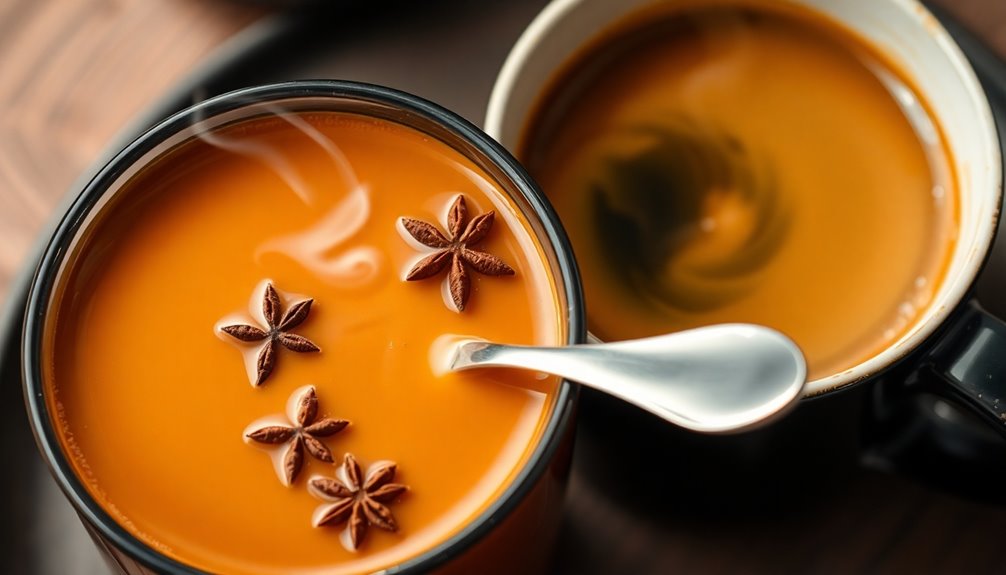
When you compare chai to coffee, you'll notice a significant difference in caffeine levels.
A typical chai has about 40mg of caffeine, while coffee packs around 120mg, giving you a steadier energy release with less chance of jitters.
This makes chai a great option if you prefer a calmer focus throughout your day.
Caffeine Levels in Chai
Curious about how chai tea stacks up against coffee with respect to caffeine? Here's what you need to know about chai's caffeine content:
- A typical serving of chai tea contains approximately 40mg of caffeine, much lower than coffee's average 120mg.
- Caffeine content can vary based on preparation methods, with some brands like Prana Chai offering between 20 to 100mg per cup.
- The presence of tannins slows caffeine absorption, helping you maintain a calm and focused state, unlike the jitters from coffee.
Keep in mind that steeping time is essential; reducing it can cut caffeine content by up to 80%.
And if you enjoy chai lattes, expect caffeine levels between 25 to 55mg, depending on the mix. Additionally, regular tea consumption has been associated with improved cognitive function, making chai a beneficial choice for mental clarity.
Coffee Caffeine Comparison
Chai tea offers a gentler caffeine experience compared to coffee, making it an appealing choice for those looking to reduce their intake. A typical serving of chai tea contains about 40mg of caffeine, considerably lower than the average coffee cup, which has around 120mg.
The caffeine in chai is released more slowly due to the tannins, promoting a calm focus instead of the jitters often linked to coffee. Depending on preparation methods, chai lattes can have caffeine levels between 25 to 55mg, still less than standard coffee. This gradual release of caffeine not only helps maintain a steady energy level but also enhances the overall drinking experience. Additionally, the creamy texture of a chai latte can create a comforting beverage that pairs beautifully with the spiced flavors. When considering a chai latte, it’s also important to be mindful of the chai latte calorie content, which can vary depending on the choice of milk and added sweeteners, making it a delightful yet indulgent option.
Regular infusion of chai yields around 11-24mg of caffeine, while concentrates may pack more punch, making chai a versatile option in the caffeine comparison with coffee. Additionally, ethical sourcing practices in tea production, similar to those in coffee, can enhance the overall experience for consumers seeking quality and sustainability.
Effects on Energy Levels
While both chai tea and coffee can boost your energy levels, their effects on your body differ considerably.
Chai tea offers a gentler, more sustained energy boost, thanks to its lower caffeine content and unique composition.
Here's how it stacks up against coffee:
- Calmer Absorption: The tannins in chai slow caffeine absorption, avoiding the quick spikes associated with coffee.
- Enhanced Focus: Chai promotes mental clarity and sustained focus without causing jitters or hyperactivity.
- Evening Enjoyment: You can sip chai in the evening without disrupting your sleep patterns, unlike coffee.
- Spice Benefits: The essential spices used in chai, like cardamom and ginger, not only enhance flavor but also contribute to improved digestion and overall wellness.
Factors Influencing Caffeine Levels
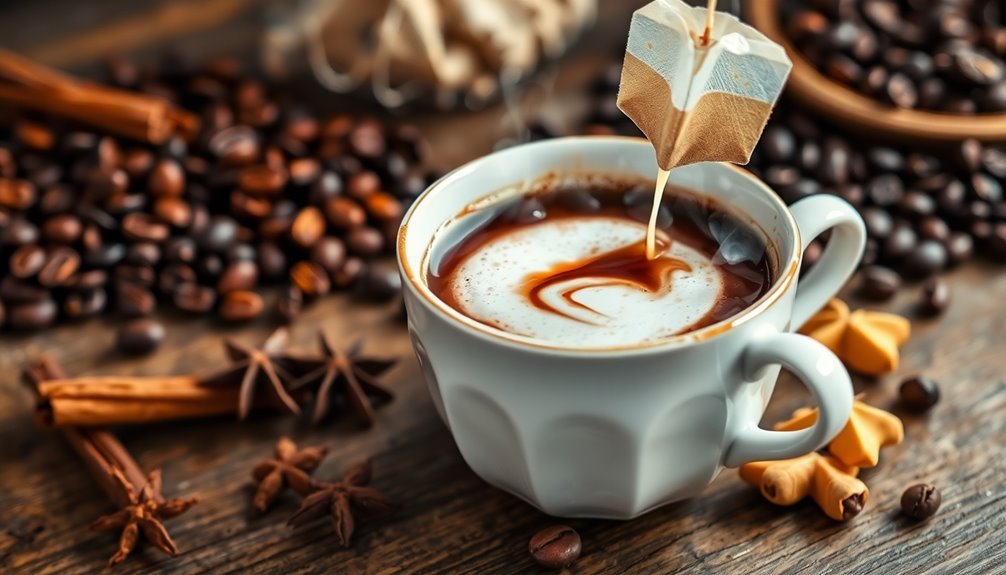
When considering factors that influence caffeine levels in chai tea, the type of tea used plays an essential role. Traditional black tea typically has about 40mg of caffeine per serving, while the brewing time notably affects caffeine extraction.
Steeping for longer can yield higher caffeine content; for example, a 10-minute steep may produce around 21mg. Additionally, the tea to spices ratio impacts caffeine levels—more spices can dilute the caffeine concentration from the tea.
Preparation methods also matter; chai lattes made from concentrates may contain 30 to 35mg of caffeine, while powdered chai usually offers lower caffeine levels than loose-leaf chai.
Understanding these factors helps you gauge your chai tea's caffeine content more accurately.
Health Effects of Caffeine in Chai
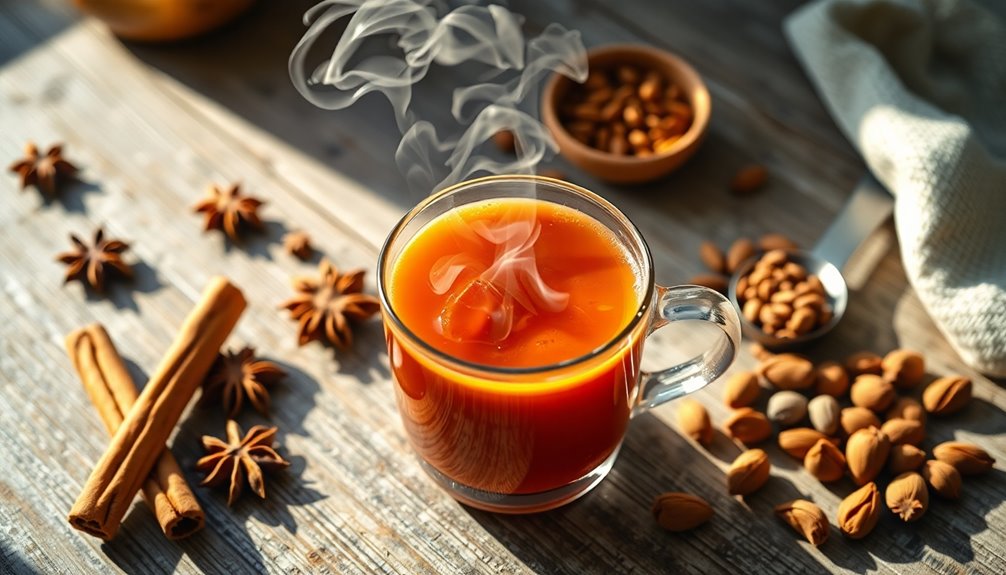
Understanding how caffeine levels vary in chai tea sets the stage for exploring its health effects.
Chai tea offers a unique blend of caffeine and beneficial compounds, making it a great choice for many. Here are three key health benefits to evaluate:
- Enhanced Cognitive Function: The combination of caffeine and L-theanine in chai promotes improved clarity and focus.
- Calmer Caffeine Absorption: Tannins in chai slow down caffeine absorption, reducing jitters commonly associated with coffee.
- Rooibos Chai Alternative: For those sensitive to caffeine, rooibos chai provides a caffeine-free option while still delivering valuable health benefits from chai spices.
Popular Chai Preparations
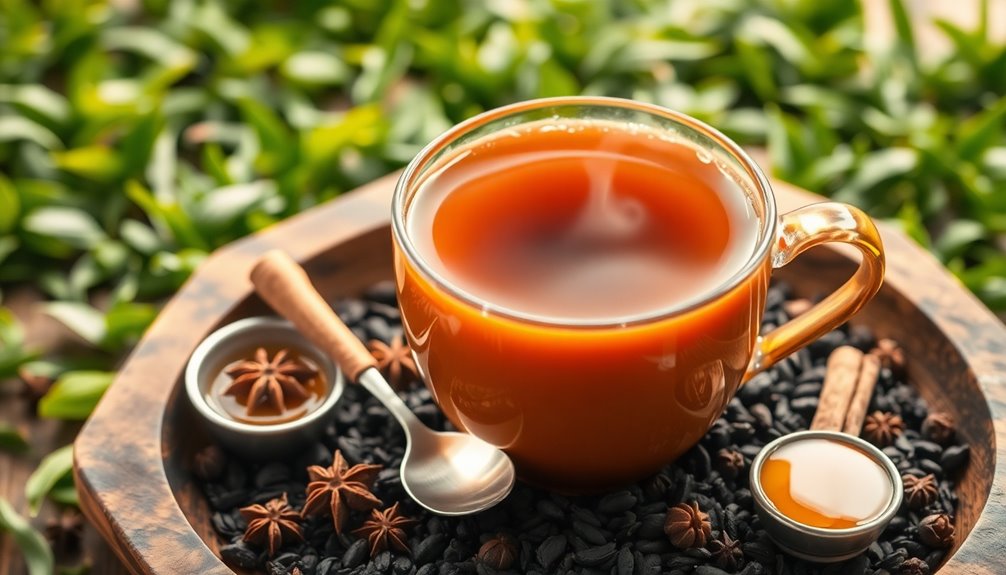
Chai preparations come in various forms, each offering a unique taste and experience. Traditional masala chai, made with black tea, typically has about 40mg of caffeine per serving, considerably less than coffee.
If you opt for chai lattes made from concentrates, you might find caffeine levels between 30 to 55mg. The steeping time plays an essential role; a longer steep can release more caffeine, yielding up to 21mg in just 10 minutes.
If you prefer green tea, it offers lower caffeine than black tea, while rooibos is caffeine-free.
Powdered chai mixes usually have less caffeine than traditional brewed chai, averaging around 25 to 35mg. Your choice of preparation methods can greatly influence the overall caffeine experience. Additionally, incorporating ingredients like chia seeds into your chai can enhance its nutritional benefits, providing fiber and omega-3s.
Shopping for Chai Options
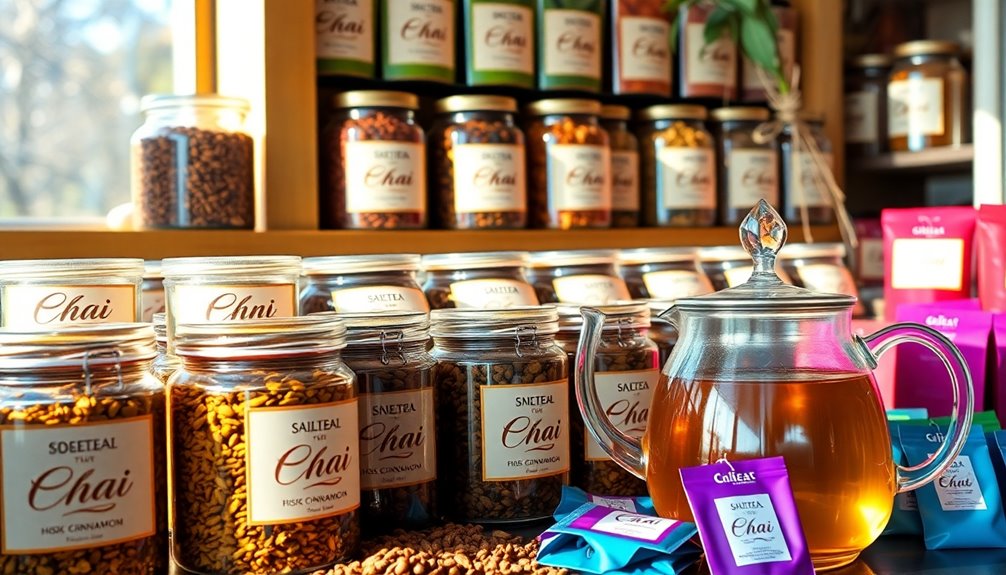
If you're looking to explore different chai options, you'll find a wide range of flavors and price points to suit your taste. Here are a few recommendations to get you started:
- Traditional Masala Chai: Typically starts at around $3.00, providing an affordable introduction to spiced tea.
- Saratoga Red Chai: This caffeine-free option is priced from $4.00, perfect for those sensitive to caffeine.
- Unique Flavors: Try Spiced Orange Chai for about $3.20 or indulge in Golden Dragon Chai for approximately $3.80, known for its distinct taste.
In addition to these options, you might want to consider chai blends that incorporate essential oils for respiratory health, as they can enhance your overall wellness experience.
With these options, you can enjoy traditional masala and innovative blends, all while keeping an eye on pricing.
Happy shopping!
Frequently Asked Questions
How Much Caffeine Is in Chai Tea Vs Coffee?
When you compare chai tea to coffee, you'll find chai generally has less caffeine.
A typical cup of chai offers about 40mg of caffeine, while coffee usually packs around 120mg. The exact amount in chai can vary based on how it's prepared, with some variations ranging from 20 to 100mg.
The tannins in chai help you feel focused and calm, unlike the jitteriness that often comes with a strong coffee.
How Much Caffeine Is in a Starbucks Chai Tea?
When you order a Starbucks Chai Tea Latte, you're getting about 95 mg of caffeine in a grande size.
This caffeine comes from the black tea base in their chai concentrate, making it a moderate option compared to coffee, which typically has around 120 mg.
If you prefer something with less caffeine, you can opt for the decaffeinated version, which has minimal caffeine while still delivering that delicious chai flavor you love.
How Much Caffeine Is in a 12 Oz Dirty Chai?
Imagine savoring a warm, spicy embrace in a cup.
A 12 oz dirty chai typically packs between 40 to 80 mg of caffeine. This depends on how much espresso you add and the chai base you choose.
The base usually contributes about 40 mg from black tea, while a shot of espresso adds around 63 mg.
Adjusting the espresso or opting for decaf can help control your caffeine intake, letting you enjoy without the jitters.
Will Chai Tea Keep You Awake?
Chai tea can keep you awake, but it depends on how you react to caffeine.
With about 40mg of caffeine per serving, it's less potent than coffee, offering a gentle boost in alertness. The calming ingredients help prevent jitters, allowing you to feel focused instead of wired.
If you enjoy it in the evening, you might find it relaxing enough not to disrupt your sleep, making it a great option any time of day.
Conclusion
To conclude, chai tea offers a delightful balance of flavors and caffeine. On average, an 8-ounce cup contains about 50-100 milligrams of caffeine, which is considerably less than the 95 milligrams found in a typical cup of coffee. This makes chai a great option if you're looking for a gentler pick-me-up. So, next time you sip your chai, remember you're enjoying a tasty beverage that energizes without overdoing it!
